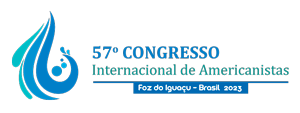| Autor | Mônica Guimarães Teixeira do Amaral |
|---|---|
| Sua instituição | Faculdade de Educação - Universidade de São Paulo FEUSP |
| Co-autor | Tanya L. Saunders |
| Instituição co-autor | College of Arts, Humanities and Social Sciences- University of Maryland |
| Área Temática | 15. Filosofia e Pensamento |
| Título | Towards a Southern Afro-Brazilian and Afro-Latin American Epistemology: a necessary debate on Critical Theory |
| Resumo | In Brazil, the studies by Munanga, Carone and Bento, as well as Gomes are fundamental for the explicitness of Brazilian-style racism, a term used to denote the myth of racial democracy built around the ideal of miscegenation between the three “races”, in order to alleged the nation“whitening”. The studies of US black feminism promoted by Davis, bell hooks, Hill Collins, Connell, as well Brazilian ones, by Gonzalez, Carneiro, Rios, Xavier and Ribeiro, whose contributions have emphasized the educative role of the black movement, offering elements to think about the specificity of the black women's struggle within the emancipatory movements in Brazil. From the point of view of knowledge, the epistemologies of black feminisms seem fundamental to Latin America, both for the systematization of knowledge of Afro-descendant populations, as well as for the construction of the epistemic transversality between the dimensions of race, class, gender and sexuality. Dimensions that are necessary to think, the subjectivity / identity of the black subjectivity and the production of dialogized knowledge open to differences. This line of interpretation gives new contours to the debate raised by Adorno regarding education and emancipation, which points to the need to offer a diversity of experiences enabling multiple identifications and respect for otherness, as well as Honneth on the need for recognition of the culture, identity / subjectivity and rights of historically disadvantaged peoples. Notions that can be updated from the propositions of Santos, concerning Southern Epistemologies, socially and culturally compromised with the knowledge of peoples who were historically disadvantaged and subordinated by Western Civilization. Considering also the decolonial critique of knowledge made by researchers such as Wynter, Quijano and Maldonato-Torres from which we think it is possible to renew South American Critical Theory and advance it based on the Afrocentric knowledge. |
| Palavras-chave |
|
